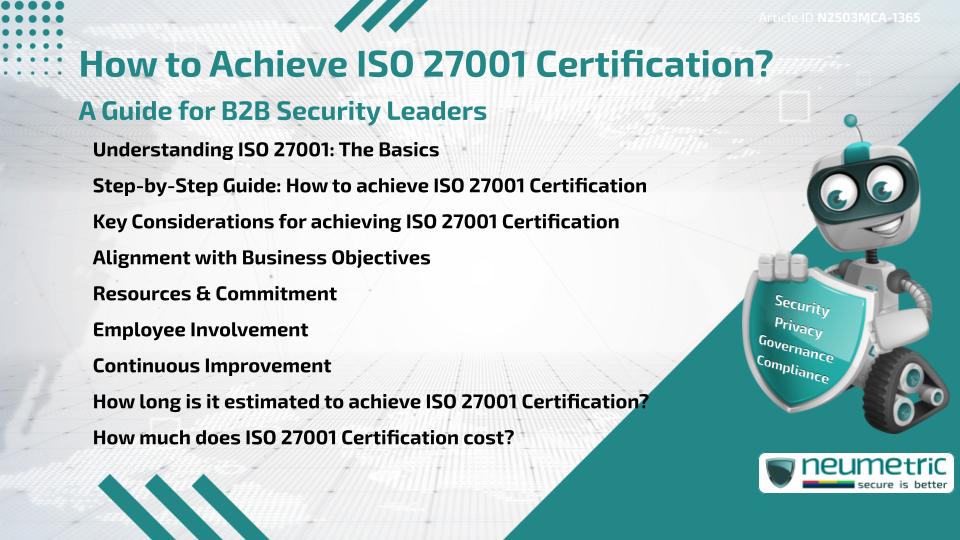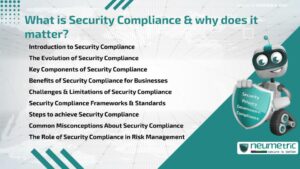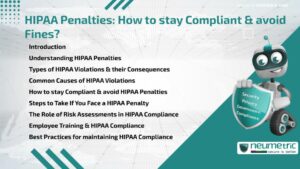Table of Contents
ToggleIntroduction
ISO 27001 Certification is a crucial standard for Businesses aiming to protect their Information Assets. It provides a Framework for Establishing, Implementing, Maintaining & improving an Information Security Management System [ISMS]. For B2B Leaders, achieving ISO 27001 Certification not only strengthens the Security Posture but also builds trust with Clients & Partners. This guide will walk you through the process of how to achieve ISO 27001 Certification, offering insights into its historical context, practical steps & key considerations.
Understanding ISO 27001: The Basics
ISO 27001 is an internationally recognised standard that outlines the requirements for creating an effective ISMS. The standard was first published in 2005, with revisions to keep pace with changing Security Threats & Technological Advancements. The purpose of ISO 27001 is to ensure that an Organisation’s information is secure, safeguarded against Data Breaches & managed in a Systematic way.
Unlike other Cybersecurity Frameworks, ISO 27001 focuses not just on the Technical aspects of Security but also on the Processes, People & Policies that impact Information Security. Achieving ISO 27001 Certification requires a comprehensive approach that addresses all of these components.
Step-by-Step Guide: How to achieve ISO 27001 Certification
Achieving ISO 27001 Certification involves a series of steps, each designed to ensure that your Organisation can effectively manage & protect its information. Below is a breakdown of steps for how to achieve ISO 27001 Certification:
Step 1: Define the Scope of ISMS
The first step in achieving ISO 27001 Certification is defining the Scope of ISMS. This means deciding which parts of your Business will be covered by the Certification. The Scope should include areas where Information Security is critical, such as Finance, Customer Data & Intellectual Property.
Defining the Scope helps you focus on the most important aspects of your Business & ensures that the Certification process is manageable & relevant to your needs.
Step 2: Perform a Risk Assessment
One of the core components of ISO 27001 is Risk Management. To achieve Certification, you need to conduct a thorough Risk Assessment. This involves identifying potential Security Threats & Vulnerabilities, evaluating the likelihood of their occurrence & determining their impact on your Business.
A Risk Assessment helps prioritise security efforts & resources, ensuring that the most critical risks are addressed first. This process is key to aligning your ISMS with the ISO 27001 requirements.
Step 3: Develop Security Policies & Controls
Once the Risk Assessment is complete, the next step is to develop Policies & Controls to mitigate the Identified Risks. ISO 27001 includes a comprehensive list of Security Controls, which should be tailored to your Organisation’s needs. These controls might include measures related to Access Control, Encryption, Incident Response & Employee Training.
Security Policies & Controls form the foundation of your ISMS & play a crucial role in demonstrating your commitment to Information Security.
Step 4: Implement the ISMS
With Policies & Controls in place, the next step is to implement the ISMS. This involves integrating Security Measures into your day-to-day operations, training staff & ensuring that all relevant processes are followed. Successful implementation requires strong Leadership, Clear Communication & Support from all levels of the Organisation.
At this stage, you will also need to establish Procedures for Monitoring & Reviewing your ISMS to ensure it remains effective.
Step 5: Conduct an Internal Audit
Before applying for Certification, you must conduct an Internal Audit to assess the effectiveness of your ISMS. This Audit should identify any Gaps or Areas of improvement. If issues are found, they should be addressed before moving forward with the Certification process.
An Internal Audit is an important self-assessment that helps you verify Compliance with ISO 27001 requirements & identify areas for improvement.
Step 6: Engage an External Auditor
Once the Internal Audit is complete & all issues have been addressed, you can engage an accredited External Auditor to conduct a formal ISO 27001 Audit. The External Audit involves a thorough examination of your ISMS to ensure it meets the Standard’s requirements.
If the Audit is successful, the certification body will issue the ISO 27001 certificate, validating your Organisation’s commitment to Information Security.
Step 7: Continuous Improvement
Getting the ISO 27001 Certification is not the end of the journey. The standard emphasises continuous improvement, which means regularly reviewing & updating your ISMS to keep pace with changing risks, technologies & Business needs.
Ongoing monitoring, Internal Audits & employee training are essential for maintaining ISO 27001 Certification over time.
Key Considerations for achieving ISO 27001 Certification
While the steps above outline a general approach, there are several important considerations for B2B leaders when working towards ISO 27001 Certification.
Alignment with Business Objectives
ISO 27001 Certification should align with your broader Business goals. Information security is not an isolated function; it should be integrated with your Business strategy. This ensures that your Security Measures support & enable Business growth, rather than hindering it.
Resources & Commitment
Achieving ISO 27001 Certification requires dedicated resources & a significant commitment from leadership. The process can be time-consuming & costly, but the long-term benefits, such as improved Security Posture & enhanced customer trust, make it worthwhile.
Employee Involvement
ISO 27001 requires the involvement of employees across the Organisation. Security is not just the responsibility of the IT department; all employees must be aware of the Organisation’s security policies & practices. Training & awareness programs play a critical role in ensuring a successful implementation.
Conclusion
ISO 27001 Certification is a valuable asset for Businesses looking to safeguard their information & strengthen their Cybersecurity Framework. Organisations can demonstrate their commitment to Information Security by following a clear, structured approach, successfully achieving Certification. However, it is essential to view certification as a continuous process that requires ongoing effort & improvement.
Takeaways
- ISO 27001 provides a comprehensive framework for managing Information Security Risks.
- The process involves Defining the Scope, Performing a Risk Assessment, Developing Policies & Controls, Implementing the ISMS & Undergoing Audits.
- Achieving ISO 27001 Certification requires ongoing monitoring & improvement.
- Employee involvement, resource allocation & alignment with Business objectives are key to success.
FAQ
How long is it estimated to achieve ISO 27001 Certification?
The time it takes to achieve ISO 27001 Certification varies depending on the size & complexity of the Organisation. On an average, it can take between six (6) months to one (1) year to complete the process.
How much does ISO 27001 Certification cost?
The Cost of ISO 27001 Certification depends on several factors, including the size of the Organisation, the Scope of the ISMS & the Certification Body chosen. Costs range can vary from a few thousand dollars to tens of thousands.
Is ISO 27001 Certification mandatory?
ISO 27001 Certification is not mandatory, but it is highly recommended for Businesses handling Sensitive Information. Many Clients & Partners prefer to work with certified Organisations due to the assurance it provides regarding Information Security.
Can Small Businesses achieve ISO 27001 Certification?
Yes, Small Businesses can achieve ISO 27001 Certification. The process may be less complex than for Larger Organisations, but the core principles still apply. Small Businesses should focus on developing a scalable ISMS tailored to their needs.
Add Image





